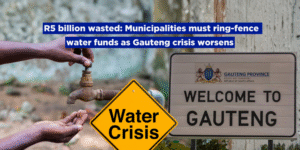The City of Cape Town, as with other metros in South Africa, has seen an unprecedented increase in unlawful occupation since the start of the Covid-19 national lockdown in March 2021.
Official assessments show the unlawful occupation have been primarily orchestrated, large-scale occupations driven by criminal syndicates or so-called ‘shack farmers’, especially exploiting those who were adversely impacted by Covid-19 in particular. Occupations have mostly happened on completely unsuitable land – in dams, ponds, wetlands, roads and nature reserves.
A clear and holistic way forward is required to navigate the complexities of the human settlements reality and to ensure that new plans and programmes for the inclusive development of Cape Town are protected from the negative consequences brought on by unlawful occupation.
Hence the introduction of the draft Unlawful Occupation By-law, which is undergoing public participation. The draft by-law is expected to streamline procedures underpinning the effective resolution of complaints, and to mitigate risks to the City, individuals and landowners by ensuring necessary and ongoing enforcement actions are supported by legislation.
Unlawful occupation means:
- Health and safety hazards for those settling on unsuitable land, such as with the flooding that we have seen again recently. Some 70% of the new recently occupied areas are on unsuitable land, such as in dams and ponds designed to catch water especially during times of heavy rainfall.
- Planned projects and programmes, such as the R3,3 billion earmarked capital spend on human settlement projects over the next three years are at risk. Unlawful occupation leads to the redirecting of budgets for services and programmes at the cost of planned projects.
- Criminal syndicates dictate the development of Cape Town.
- People are settling in areas where no provision for bulk services have been made.
- People are settling on railways, which means tens of thousands of people do not have access to public transport.
- People are setting on nature reserves, not suitable for human habitation.
- With the criminal land syndicates, illegal connection syndicates are thriving. The spike in unlawful occupation has seen a spike in illegal connections. This places the electricity supply infrastructure at risk, and often leads to existing communities being in the dark due to the overloading of the system.
- People settle on top of bulk services infrastructure. If there is a blockage or a problem that needs fixing, the City then cannot access the infrastructure.
- Illegal water connections are made that jeopardises the water supply system.
- Unlawful occupation often impacts on waterways and pollution of water resources as there are no sanitation facilities in place.
- The City’s new Human Settlements Strategy contains a profound shift to enable the greater provision of affordable housing opportunities, based on partnerships and new ways of delivery and to address growing informality. But all these plans are placed at risk with unlawful occupation.
Local government cannot solve the great need for affordable accommodation on well-located land on its own. It takes all three spheres of government, the private sector, and residents working with us.
However, urgent policy and legislative reforms are needed to address the major obstacles to human settlements delivery, which include unlawful occupations, National Government budget cuts, a weak national economy, a fragmented, haphazard and unclear lack of national policy implementation, including an absence of an adequate national redistribution policy. And it is against this backdrop that informality is set to grow.
Unlawful occupation and the new Managed Settlement Programme
At the heart of the draft Unlawful Land Occupation By-law and framework, is the development of the Managed Settlements Programme. The programme intends to create the opportunity to allow residents to lawfully and safely erect informal structures on land that has been prepared for service access and infrastructure installation. This would be the rapid, affordable housing solution that is required.
Housing and permanent service access are captured within the Constitution of South Africa as being elementary to the basic needs of all residents of South Africa. In the resource constrained environment in which the City finds itself, providing housing and services for all, and at the same time, is not possible. However, an alternative source of provision, namely a Managed Settlement Programme, must be piloted and the City needs to lead this initiative. It will need the cooperation of communities and civic organisations to help the City make this a success. Further orchestrated unlawful occupations or incitement to occupy illegally will jeopardise such a pilot programme to the detriment of all.
Managed Settlements Programme
To work with informality and to reduce the risks that spur on unlawful land occupations, the City needs to identify those elements that the informal housing system does well and shape them into a better managed development response. This includes legally enabling residents to erect their own structures on identified land parcels; ensuring safety and environmental integrity; providing temporary basic services where possible with the future possibility of connection to the City’s infrastructure grid.
Examples of what the informal housing system does well:
- Rapid construction time
- Complex modular design
- Self-organisation
The new plan to address informality thus comprises a sustainable, legal housing response that is not a temporary relocation area.
It comprises progressive improvement over time and formalising the informality with for instance:
- Electricity prepaid meters
- Individual services per site
- Occupation recognition
- Permission to upgrade own structure with formal building material (with conditions)
- Option of site ownership
- Access criteria
- Screening criteria
- Case history (i.e. from where did they originate)
Apart from safeguarding vital plans and programmes, the draft by-law thus provides for identifying and developing land for managed settlements, interim and emergency services to unlawful occupants of land, and voluntary relocation of unlawful occupants to managed settlements including transporting them. Furthermore, it specifically includes the City policies which are aligned to the national housing policies and frameworks and has been drafted to ensure its constitutionality and its alignment with the Prevention of Illegal Eviction from and Unlawful Occupation of Land Act.
Powers in the by-law
It is important to note that the powers to summons, issue admission of guilt fines, arrest, and search, are those conferred on law enforcement officers under the Criminal Procedure Act. The by-law now limits and explicitly states that law enforcement officers can:
- Direct a person to stop prohibited conduct, remove an obstacle, and to leave and remain out of a specified place
- Issue compliance notices as well as notices to appear in court or pay a fine
- Arrest a person who commits an offence in terms of the by-law and to search a person if necessary
- Impound goods and materials as per the City’s Standard Operating Procedure on the Impoundment of Goods and Animals, 2012
- Require identification
Unlawful occupation is already an illegal act as defined by common, statutory, and public law legislation in South Africa and an ordered approach is required to protect municipal land from illegal occupation attempts. We owe this to future generations of a growing city who will require land for schools, hospitals, transport, housing, community facilities, and more and we cannot allow our plans and programmes to be jeopardised.
Comments can be lodged until 31 July 2021 and can be sent via email to unlawful.occupation@capetown.gov.za.




